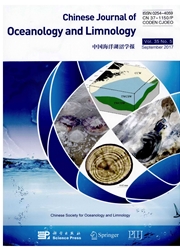

 中文摘要:
中文摘要:
PCNA 在种水平为海洋的浮游植物的生长率的评价被看作了一个有用标记。因为 dinoflagellates 以在那有许多原核生物的特征闻名,他们是唯一的优核质永久地压缩了象缺乏一样的染色体嘘和 nucleosome,到 UVB 放射的敏感和象在 dinoflagellate 的生长率的一个制造者的 PCNA 的有效性需要被评估。Prorocentrum donghaiense 陆被调查到 valuate 在与 PCNA 的细胞、分子的方面的关系的 UVB 敏感作为生长指示物。PCNA 上的 UVB 放射的效果与一个用西方的污点技术和整个房间的 immunoflurescence 的方法被学习单音抗体。UVB 改变了房间形态学,停止了生长并且增加了房间尺寸,甚至引起的房间死亡到在有在 P 的 UVB 放射的处理以后的某个程度。donghaiense。与控制相比,为 24 h 与 UVB 放射在指数的阶段对待海藻的文化引起了在 PCNA 的蛋白质层次的染色质版本和增加。
 英文摘要:
英文摘要:
PCNA has been considered as a useful marker for the estimation of growth rates of marine phytoplankton at the species level. Since dinoflagellates are noted for having many prokaryotic features in that they are the only eukaryotes to have permanently condensed chromosomes as well as lacking histones and a nucleosome, the sensitivity to UVB radiation and the validity of PCNA as a maker of growth rate in dinoflagellate need to be evaluated. Prorocentrum donghaiense Lu was investigated to valuate the UVB sensitivity in relation to cellular and molecular aspects of PCNA as a growth indicator. The effects of UVB radiation on PCNA were studied using the methods of western blots technology and whole-cell immunoflurescence with one mono-antibody. UVB changed the cell morphology, halted the growth and increased the cell size, even caused cell death to a certain extent after treatment with UVB radiation in P. donghaiense. Compared with the control, treating the algal cultures in exponential phases with UVB radiation for 24 h caused chromatin release and increases in protein levels of PCNA.
 同期刊论文项目
同期刊论文项目
 同项目期刊论文
同项目期刊论文
 期刊信息
期刊信息
